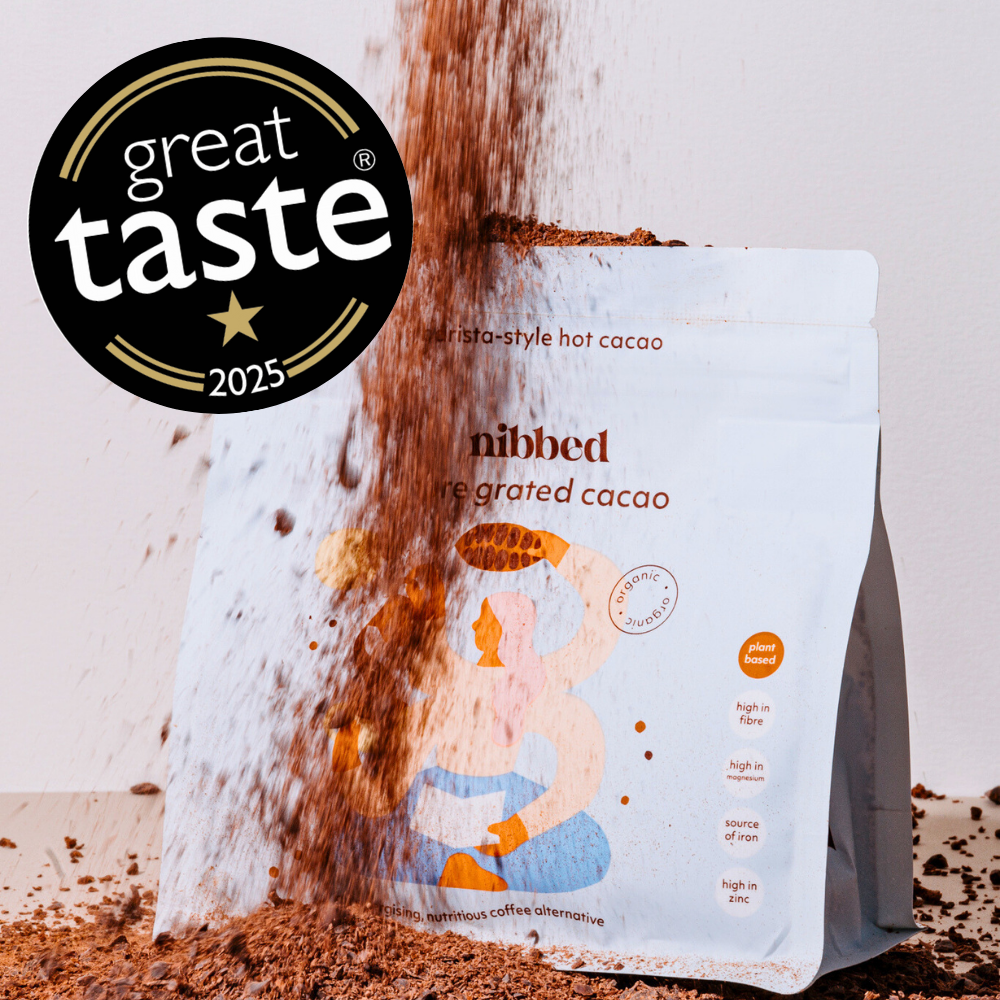
Why Is Cacao Bitter?
If you've ever tasted a cacao bean, you'll know that it's pretty bitter. But why is this the case? In this article, we'll explore the flavour of cacao and why it has such a strong bitter taste.
What is Cacao?
Before we dive into the science of cacao's bitterness, let's define what it is. Cacao is the purest form of chocolate. It comes from the cacao tree, Theobroma Cacao. The seeds of the tree - i.e. the cacao beans - are harvested and then processed to create a range of cacao-based products including our pure cacao blocks and chocolate.

What Makes Cacao Bitter?
Cacao gets its bitter taste from a group of compounds called polyphenols. These compounds are also found in other bitter foods, such as coffee and tea. Polyphenols are a type of antioxidant, which means that they protect the body from damage caused by free radicals.
One of the primary polyphenols found in cacao is called flavanols. Flavanols are responsible for many of the health benefits associated with chocolate, such as improving heart health and reducing inflammation. However, they also contribute to the bitter taste of cacao.
Another compound found in cacao that contributes to its bitterness is theobromine. Theobromine is a stimulant similar to caffeine and it's what makes cacao a great coffee alternative. It has a bitter taste and contributes to the overall flavour profile of cacao.

Fermentation to Reduce Bitterness
To reduce the bitterness of cacao slightly, it undergoes a process called fermentation.
During fermentation, the white pulp surrounding the cacao beans is broken down by bacteria and yeast. This process creates heat, which activates enzymes in the beans that break down the polyphenols and reduce the bitterness. After fermentation, the beans are gently roasted to further develop their flavour.

Why Does Bitterness Matter?
Bitterness is one of the five primary tastes that our taste buds can detect, alongside sweet, sour, salty, and umami.
Bitterness is an essential aspect of the flavour of cacao and chocolate. It adds complexity to the taste profile and contributes to the overall experience of eating chocolate. Without bitterness, chocolate would be overly sweet and lack depth.

Bitterness also has physiological effects on the body. As we mentioned earlier, polyphenols are antioxidants that protect the body from damage. They have been shown to improve heart health, reduce inflammation, and potentially lower the risk of certain types of cancer.
Bitter tastes are actually good for us in many ways. Bitter compounds contain a variety of health-promoting properties that can benefit our bodies.
Here are some of the ways that bitter tastes are good for us:
1. Improve Digestion
Bitter tastes can stimulate the production of digestive juices and enzymes, which can aid in the breakdown of food and absorption of nutrients. Bitters can also help to stimulate peristalsis, the wave-like muscle contractions that move food through the digestive system.
2. Reduce Cravings
Bitter tastes can help to reduce cravings for sweet or salty foods. When we consume bitter compounds, they activate bitter receptors in the mouth and stomach, which send signals to the brain to reduce cravings.
3. Improve Liver Function
Bitter tastes can help to improve liver function by increasing the production of bile, a substance that helps to break down fats and remove toxins from the body. Bitters can also stimulate the liver to regenerate new cells and improve overall liver health.
4. Reduce Inflammation
Bitter compounds contain anti-inflammatory properties that can help to reduce inflammation throughout the body. Chronic inflammation is linked to many chronic diseases, including heart disease, diabetes, and cancer.

Hot Cacao - Bitter or Sweet?
When many of our customers first try a Nibbed hot cacao for the first time, they can be quite shocked at how bitter it tastes. This is probably because they are used to, or expecting, a sweet hot chocolate. But that's not what a hot cacao is! We are all about nutrition and wellness, so we will certainly not be lacing our cacao in sugar or sweeteners.
If you're new to cacao, and/or have quite a sweet tooth, we recommend weening yourself onto the bitter tastes by making your hot cacao drink with all oat milk which is naturally sweet and adding 1-2 teaspoons of maple syrup or honey.
Believe us when we say, many of our customers start off their cacao journey thinking it's too bitter but after a couple of weeks they get used to, and embrace, the bitterness. They even cut out the sweetener altogether!
Here's a recipe for both a sweeter and darker hot cacao.

Conclusion
In conclusion, cacao's bitterness comes from a group of compounds called polyphenols, primarily flavanols, and theobromine. Fermentation and roasting can reduce the bitterness, but it remains an essential aspect of the flavour profile of chocolate. Bitterness also provides important health benefits, making cacao a valuable ingredient in a healthy diet. So, the next time you sip on your hot cacao, savour the bitterness and appreciate the complexity it adds to your taste buds.
![Pure Cacao Grated [200g]](http://nibbedcacao.com/cdn/shop/files/NC-193_c7a1fc90-4d56-40d6-8b7d-56fd036451e7.jpg?v=1745068591&width=65)
![Pure Cacao Grated [500g]](http://nibbedcacao.com/cdn/shop/files/NC-168_67dcf7e8-50c1-4823-b782-e438cc4b86ac.jpg?v=1745068523&width=65)

![Pure Cacao Block [300g]](http://nibbedcacao.com/cdn/shop/files/Nibbed_Cacao_Block_300g_064abb3e-c390-4666-ae85-52298d2516a3.png?v=1749477474&width=65)








![Pure Cacao Grated [200g]](http://nibbedcacao.com/cdn/shop/files/NC-193_c7a1fc90-4d56-40d6-8b7d-56fd036451e7.jpg?v=1745068591&width=2000)
![Pure Cacao Grated [200g]](http://nibbedcacao.com/cdn/shop/files/Nibbed_Pure_Cacao_-_Great_Taste_1.png?v=1753872308&width=2000)
![Pure Cacao Block [300g]](http://nibbedcacao.com/cdn/shop/files/Nibbed_Cacao_Block_300g_064abb3e-c390-4666-ae85-52298d2516a3.png?v=1749477474&width=2000)
![Pure Cacao Block [300g]](http://nibbedcacao.com/cdn/shop/files/NC-108_a65d8ad1-d017-4815-beb3-d3f822b8d5a6.jpg?v=1749472074&width=2000)
![Pure Cacao Grated [500g]](http://nibbedcacao.com/cdn/shop/files/NC-168_67dcf7e8-50c1-4823-b782-e438cc4b86ac.jpg?v=1745068523&width=2000)
